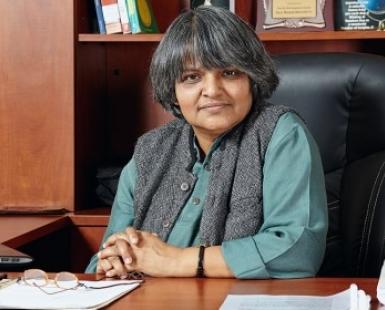Quantum optics is an extremely rich and diverse field with applications ranging from super fast computers (quantum computers) to establishing a zero-failure communication system! Forming one of the most sought after fields in natural sciences in the present world, it holds immense potential of answering the long pressing big questions in fundamental physics, and beyond. In our first episode of the fifth season of Zeroing In, we converse with a brilliant physicist whose contributions to this field essentially laid the foundations, while the research area was taking shape in the latter half of the 20th century. Our guest for this conversation, Prof. Rupamanjari Ghosh, completed her Ph.D. from the University of Rochester, New York, where among her other pioneering ideas, her thesis was based on exploring the ‘Non-classical effects in the interference of two photons' with Prof. Leonard Mandel, widely known as one of the founding fathers of the field of Quantum Optics. Prof. Ghosh moved back to India as a professor at JNU, Delhi where she worked for the major part of her academic career. Subsequently, she moved to Shiv Nadar University as the Founding Director of Natural Sciences and later took over as the Vice Chancellor at the SNU. She has also contributed immensely to nation building over the years as an all rounded-researcher and teacher in academia, as well as in very significant capacities as a policy maker at the apex institutions and organisations such as NCERT, DST, UGC and CSIR, among others, throughout her career. In the second and final part of the conversation in the first episode of Season 5, we continue our dialogue with the distinguished physicist, Prof. Rupamanjari Ghosh. In this episode, we delve deeper into her contributions to the field of Quantum Optics, as well as her experiences as a teacher and policy maker at the apex institutions. We talk at extent about developing the theory as well as the experimental setup for the two-photon interference experiment while also traversing through her personal anecdotes and some extremely fascinating insights.
I had the habit of taking up any problem and solving it from first principles. I think that saved me in research as there was no one to tell me the right way back then, or even taught in schools.
ABOUT THE GUEST

Prof. Rupamanjari Ghosh Former Vice Chancellor of Shiv Nadar University Delhi-NCR, Former Professor of Physics & Dean of School of Physical Sciences at Jawaharlal Nehru University
Prof. Ghosh pursued her Bachelors and Masters of Science at the University of Calcutta, graduating in 1980. She then moved to the United States for her PhD at University of Rochester, New York, where she worked with Prof. Leonard Mandel. It was during her doctoral years that she undertook, among other ideas, the pioneering work on Non-classical effects in the interference of two photons which essentially is considered to be one of the holy grails of the field of quantum optics. Upon completion of her PhD, Prof. Ghosh moved back to India to join the Jawaharlal Nehru University as a professor, where she worked for the major part of her career, until 2012, while also holding multiple visiting positions through the years at the Université Paris-Sud, and École Normale Supérieure among others. Prof. Ghosh has served in pivotal roles on multiple national scientific and educational bodies, including the National Council of Education Research and Training (NCERT), DST, UGC and CSIR, among others. She was the Vice-Chancellor at the Shiv Nadar University from 2016-2022, and currently is also on the Advisory Board of the Executive Leadership Academy at the University of California, Berkeley. Prof. Ghosh has not only contributed immensely to the field of science and technology through her brilliant work, but has also made an indelible mark in the society through her significant contributions as a policy maker, and an administrator with various educational institutions and governing bodies at different levels.



